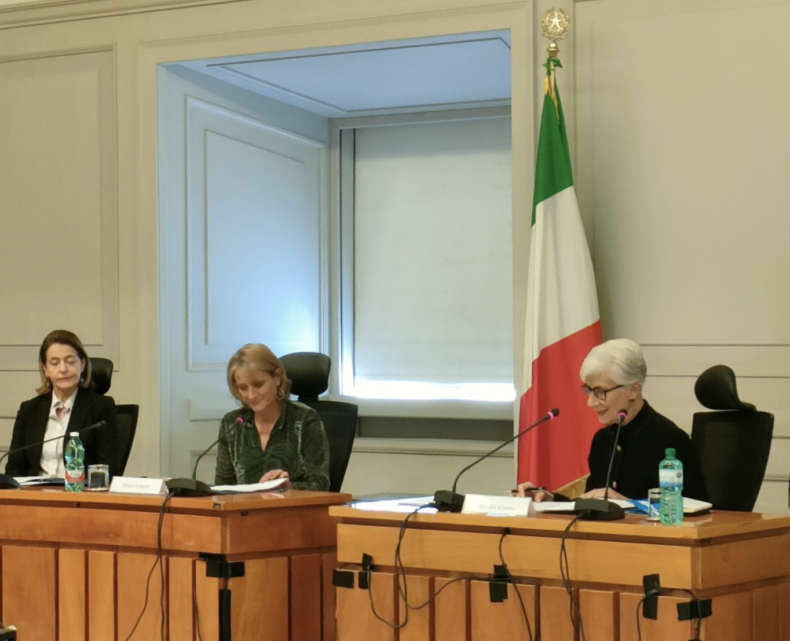In the 75th anniversary of Italian Constitution, an educational project to enhance its values

A dialogue open to civil society, to question what equality means today and how the principle brought about by Article 3 of the Italian Constitution “should guide the next choices that the country is called to make”. This is the challenge of “Art. 3: different among equals”, a project developed by the Union of Italian Jewish Communities in collaboration with Ferrara’s Museum of Italian Judaism and the Shoah during the 75th anniversary of the Constitution. “Art. 3: different among equals”, presented last week at the Constitutional Court’s headquarters, will see a total of six meetings that will be held in six Italian cities. It has a format which envisages a discussion between two scholars, an educational experimentation with children from 6 to 11 years old, and the preparation of a dossier consisting of written contributions and documentation that will allow a formative action.
This is a project “that I have looked at with great care” and that “has its own parallelism with the commitment just renewed by the Constitutional Court: the judges’ trip to the Italian schools to raise awareness regarding the functions that the Court performs”, these are the words of welcome of President Silvana Sciarra. In wishing the project’s success, Sciarra also recalled Liliana Segre’s admonition in her speech at the Senate at the beginning of the legislature, during which, among other things, she recalled that the Constitution needs to be applied without wasting a single minute. Sciarra commented on it saying that “it is necessary to spread a constitutional culture because our rights must be known and protected”: in this sense “there is strong affinity with UCEI”.
The senator for life, connected remotely, expressed her approval and said that “it is particularly significant the fact that a small but qualified and dynamic part of Italian society has decided to engage with such central aspects”. As stated by the senator, it is “an act of attention and true constitutional patriotism: in fact, I must confess I cannot fathom people talking about the Constitution as a problem”. On the contrary, according to her, “it has given us all the tools to tackle various problems and solve them through democracy, justice, equality”. And for this reason, “we can never thank enough the constituent fathers who, faced with the spiritual and moral rubble we were left with after fascism, found the necessary intelligence, energy, and farsightedness”.
The basic idea, the UCEI President Noemi Di Segni reflected, “is to offer a contribution to the several facets of Article 3, drawing from Jewish knowledge and mindset”. The Constitution, she proceeded, “is not abstract and distant, it is living matter of everyday life, close to each citizen and institution”, and it is the duty of each one to take action “to give a tangible meaning to what it establishes”. Di Segni said she was proud to find, within the Constitution, “biblical pillars” that address the individual as well as the collective, those who govern and those who are governed. There are many challenges to be addressed and a commitment to pursue, especially during these trying times: “the imperative of life”.
Saul Meghnagi, councillor and coordinator of the UCEI Culture Commission, outlined the themes and perspectives of the project. An ongoing work “that has seen, over time, experts from different branches of knowledge actively involved in supporting and sharing it: that is how we started, and we hope to carry on”. The UCEI, he added, “will contribute starting from the redefinition of itself as the contexts of life, work, and relations with the construction of society and national culture have transformed”.
A just and sustainable society: this is the goal, Meghnagi specified, that “doesn’t appear to be guaranteed by an approach based on solely economic variables, which are prevalent in political analysis today”, but which requires an elaboration that provides, despite the inevitable differences of opinion, “an ethical reference to protect rights of all the different groups of people”.
The UCEI councillor Gloria Arbib later reported on the MEIS’ role in the project (represented by Massimiliano Boni). “We speak of an open space and a place where culture is created” she started off, and then continued recalling MEIS’ history and announcing some of its future commitments (including two exhibitions in progress, one on synagogues, and one on the 20th century). The MEIS’ goal, said Arbib, is to “revive the importance of the Constitution and particularly of the Article 3”. Indeed, it symbolises “a cornerstone that supports everything, the principle of equality”.
The MEIS will thus make available “its expertise in the educational field”, also through workshops for children, “so that from a young age they start being familiar with both the principle of equality and the existence of rights and duties”. At the end, the judges and representatives of the UCEI delegation spoke: “We’re eager to express ourselves, to make a contribution, to strengthen protections concerning the entire community” the UCEI councillor for Communication Davide Jona Falco said. Ariel Dello Strologo, newly elected president of the Italian Association of Jewish Lawyers and Jurists, which offered her own support to the project, recalled the impact that several Jewish jurists had “in the development of law”. Three Court judges also took the floor: Giulio Prospetti emphasized that “in a world where there are many persecutions, much remains to be done”; Vice-President Daria de Pretis praised the name of the aforementioned project, linking it to the European motto “Unity in diversity”; Franco Modugno praised the work of two Jewish judges active until recently: Edoardo Volterra and Guido Neppi Modona.
Translated by Klara Mattiussi, revised by Annadora Zuanel, students at the Secondary School of Modern Languages for Interpreters and Translators of the University of Trieste, interns at the newspaper office of the Union of the Italian Jewish Communities – Pagine Ebraiche.
